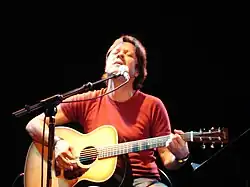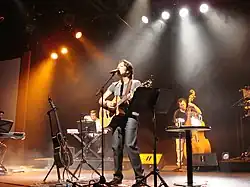Hernaldo Zúñiga
Hernaldo Zúñiga (born June 2, 1955) is a Nicaraguan singer-songwriter. He was born in Managua, but spent his childhood and adolescence in Masaya.
Hernaldo Zúñiga | |
|---|---|
 Hernaldo Zúñiga | |
| Background information | |
| Birth name | Hernaldo Zúñiga Gutiérrez |
| Born | June 2, 1955 Masaya, Nicaragua |
| Genres | Trova |
| Occupation(s) | Singer-songwriter, musician, producer |
| Instrument(s) | Voice, guitar |
| Years active | 1972–present |
| Labels | Zafiro EMI Music Mexico Warner Music Mexico Universal Music Mexico Zungu Music (current) |
Career
While he was studying in Chile, in 1973, Zúñiga recorded his first 45 rpm single with "Producciones Caracol", including as one side the David Gates' song "Everything I Own".
At 17, during his first year of law school, he composed his first song, "Ventanillas" ("Little Windows"). In February 1974, he performed in the XV Festival Internacional de la Canción de Viña del Mar.
In October of that year, he obtained seventh place in the third edition of the OTI Festival, celebrated in Acapulco, Mexico, singing the song "Gaviota" ("Seagull"), which meant the first participation of Nicaragua in this Festival.
The same year, he recorded his first album: "Del arco iris, una canción" ("A Song from the Rainbow").
In 1977 Zúñiga took part in XVIII Festival Internacional de la Canción de Viña del Mar, obtaining second place for Nicaragua with the song "Cancionero" ("Song Book").
In 1978 Zúñiga released Cancionero (Song Book), professionally starting his musical career. The production was directed by Juan Carlos Calderón.
Between December 1979 and January 1980, Zúñiga recorded a new work by the hand of the Spanish singer-songwriter Manuel Alejandro. The songs included "Procuro olvidarte" ("Trying to forget you"), "Ven con el alma desnuda" ("Come as you are"), "Un pasajero" ("A Passenger"), "Insoportablemente bella" ("Unbearably Beautiful") or "Ese beso que me has dado" ("That Kiss that You Have Given Me").
In 1982 Zúñiga recorded the album A tanto fuego (On So Much Fire) in London, Germany and Madrid.
In 1986, he released "¿Cómo te va mi amor?" ("How is it going, baby?"). Manuel Mijares also turns into success the Hernaldo's composition "Siempre" (Always). Angela Carrasco, Jeannette, Sergio and Estíbaliz and Yuri (Mexican singer) between others, endorses success of his compositions.
At this time Zúñiga took a sabbatical, and broke ties with the Zafiro record label.
Two years later, already residing in Mexico, he released the album Qué increíble es la distancia (Distance is so incredible), which included the songs "Mira arriba" ("Look Up"), "Una vez al mes" ("Once A Month"), "Tengo unos celos que matan" ("I feel so terribly jealous", "Te llevaré" ("I Will Take You with Me").

As of 1992, Zúñiga produces, prepares arrangements and composed "Después de todos estos años" (After All These Years).
In London and with the help of Chucho Merchán, he records "No tengo más patria que tu corazón" ("I Have no more Homeland than your Heart"), "¿Adónde?" ("Where?"), "Al otro lado del mundo" ("At the Other Side of the World") and "Eres todo menos azar" ("You are Everything but chance").
Zúñiga signed an exclusive contract with Universal Music Mexico. "Triángulo de musgo" ("Moss Triangle") is the title of the album that initiates his journey in his new record house. The production, arrangements and the songs were Zúñiga's responsibility; the album was recorded in London, Madrid and Los Angeles.
His production "Nómada" ("Nomad") was released in May 2007.
Zúñiga has his own record label, Zungu Music.
Main discography
- Del Arco Iris, Una Canción (From the rainbow, a song) (1974)
- Cancionero (Song book) (1978)
- Hernaldo, El Original (Hernaldo, The original) (1980)
- A Tanto Fuego (On so much fire) (1982)
- Siglo XX (20th Century) (1984)
- Qué Increíble es la Distancia (How incredible is the distance) (1988)
- Después de Todos Estos Años (After all these years) (1992)
- Triángulo de Musgo (Triangle of moss) (2001)
- Nómada (Nomad) (2007)
Live albums
- Básico D.F. (Basic D.F.) (1996)
- Ciudad Acústica (Acoustic city) (2002)
Compilations
- Los Grandes Éxitos de... Hernaldo (Greatest hits of... Hernaldo) (1999)
- Grandes Éxitos (Greatest hits) (2001)
- El Origen (The origin) (2001) (Special edition for Nicaragua)
- Mi Historia (My history) (2002)
Collaborations
- Eterna Navidad (Eternal Christmas) (1986), as part of "La Hermandad" (The Brotherhood) in a Christmas special along with: Tatiana, Manuel Mijares, Daniela Romo, Arianna, Pandora, Denise De Kalafe, Óscar Athie y Yuri.
- Diciembre 25 (December 25) (1991), Christmas special produced by Hernaldo Zúñiga, this album included the voices of singers such as Alejandra Ávalos, Fher (from [[Maná {group}|Mana]]), Ilse, Benny, Ivonne and Ivette, El Tri, Alissa, Ángel, Café Tacuba, Laura Flores, Zúñiga, Denise of Kalafe, Luis Gatica and Los Joao. Hernaldo sang "Estrella Blanca" with Laura Flores ("White Star", a Cat Stevens' "Morning Has Broken" cover, adapted by Hernaldo for a beautiful Christmas carol) and "Diciembre 25" (December 25) along with: Ángel, Ilse, Benny, Laura Flores, Alejandra Ávalos, Luis Gatica, Ivonne and Ivette, Denise de Kalafe and Alissa.
Songs composed for other artists
| Artista | Canciones |
|---|---|
| Pandora | ¿Cómo Te Va Mi Amor? Sólo Él Y Yo Todavía Amor, Amor Abusas De Mí Alguien Llena Mi Lugar No Me Queda Nada |
| Manuel Mijares | Siempre Al Caminar Volveré A Nacer Montón De Verano Desnuda (F.Migliacci-F. Marcheli-Adapt. Hernaldo Zúñiga) |
| Yuri | Perdona Si Te Pierdo No Habrá |
| Ángela Carrasco | El Tiempo Nos Pesa |
| Sergio y Estíbaliz | Te Quiero Y Ya |
| Jeanette | ¿Qué Puedo Hacer? (1984) |
| Franco | Preguntándome |
| Fernanda | Era Mejor |
| Sonia Rivas | Ayer Sin Conversar (Otra Oportunidad) De Pecho A Pecho (1987) |
| Dumas | Se Ha Terminado |
| Los Dandys | Volverás Por Mí |
| Charlie Massó | Hemos Madurado |
| Gloria y Noemí Gil | Es Tan Difícil Quererte |
| Fandango | Dame Aquel Martillo (Lee Hays-Pete Seeger-Adapt. Hernaldo Zúñiga) |
| Maribel Guardia | De Pecho A Pecho (2008) |
| Hernán Visetti | Flor De Temporada Te Haré El Amor |
| Rocío Banquells | Mineral |
| Valeria Lynch | Límite |
| Arianna | ¿Qué Puedo Hacer? (1985) |
| Jazmine Athie | Mucha Dulzura |
| Mario Castelli | Tengo Que Amarte Amor |
References
- Hernaldo Zúñiga's Official Page
- Blog dedicated to Hernaldo Zúñiga
- Yahoo Group "Qué Increíble Es La Distancia" dedicated to Hernaldo Zúñiga
- Hernaldo's Musical videos at Youtube
- AyerHoy.com "Cada día un perfil de un artista del ayer"
- Gisella Canales Ewest. "La Prensa – Revista, Artistas del Año".